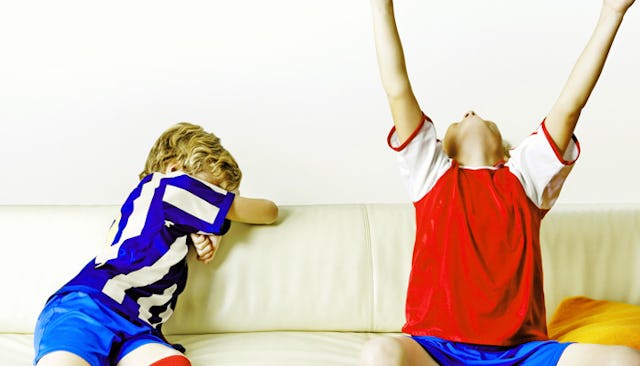Happy Kid, Sad Kid, Same Mom

Image via Shutterstock
The exuberant faces beaming from glossy family magazines is proof positive that, in our society, a happy child is synonymous with good parenting. If your little one smiles easily, laughs with enthusiasm, and toddles through life relaxed and content, you must be doing something right. Bravo! After your happy kid is in bed, pour yourself a well-deserved glass of wine because you are winning at this parenting thing!
Or maybe, like me, the universe gifted you with an easygoing child who, despite whatever shortcomings you have as a parent, charms everyone from grocery store clerks to the meter man with her dazzling smile.
Or perhaps, also like me, you are the mother of that kid. The fearful child at the playground who screams to be rescued from the monkey bars. The tot hyperventilating on the street corner when a dog passes. The anxious little one who crashes through the world in a whirl of tears and tantrums.
As the mother of two marvelously different daughters, I can say with complete confidence that sometimes, despite a parent’s best efforts, a kid is just sad. It is a cruel injustice of life that some of us, like my daughter (let’s call her E) are born with an innate joy, while others, like my second daughter (let’s call her B) struggle with anxiety and fear from infancy.
In all fairness, a truly wretched parent could crush the spirit of even the most naturally blissed-out kid, but we need to cut the parents of sad children a break. As much as I’d like to take credit for my happy kid, I can’t. She was born that way. And as much as I blame myself for my daughter B’s unease, I shouldn’t. And you, grocery store clerk, meter man, and well-intentioned strangers everywhere, shouldn’t blame me either.
My daughter B has a sensory processing disorder, and after endless hours of reading about her issues and going to more specialist appointments than I can count, the only thing I can say with authority is that the diagnosis and treatment are at times more confusing and overwhelming than the symptoms. Our daughter’s developmental pediatrician made the analogy that sensory processing disorder is like porn: Hard to define, but you know it when you see it.
A walk in the park with my daughter E is really a walk in the park. She smiles at everyone we pass, claps her hands when she sees a dog and shouts “Doggy!” with such enthusiasm that even the most hurried dog walker grins and pauses to commend me on my darling daughter. In those moments, I bask in the glory of triumphant motherhood—because I know it won’t last.
A walk in the park with my daughter B resembles a special forces formation, with my anxious child flanked by equally anxious adults who scan the perimeter for dogs, lawnmowers, and other noise-producing obstacles or approaching insects. In moments like those, I struggle to parent with grace, which is a nice way of saying that sometimes I am a bad mother.
Once, after B fled into the street for the second time, to escape a bug, I screamed at the top of my lungs: “I swear to God, if you run into the street again I will kill you myself!”
In those moments, I hate being a mother. Perhaps you’ve been there, too. As you yank your sad child to the sidewalk or lift them howling from aisle six of the grocery store, you allow yourself a moment to feel the hate, the sadness, the fear, the guilt, good God the guilt. Then, you breathe, calm down, force back the tears pooling in your eyes. Seeing you cry would only upset her more, so you swallow hard, imagining the pain is a large, bitter pill, you take deep into your stomach. It will wait until you have a minute alone, then dissolve throughout your body as it always does. Because happy kid or sad kid, you love them the same, and every time you lose it, every time you are less than perfect or they are less than perfect, you feel it deeper than any failure you’ve ever known.
Maybe you have a sad kid, or maybe your usually happy kid had a sad day. Either way, after you’ve done the best you can, and your weepy one is in bed, pour yourself a glass of wine because you definitely deserve it.
So the next time you see an exasperated mother in the Target parking lot, wrestling her thrashing child into her minivan, don’t just walk by. Your silence, whether you mean it or not, will feel to her like judgement because her child isn’t happy. If you would comment on a happy child, go ahead and comment on a sad one. Tell that mom she is doing a good job and should be commended for not beating her head against the windshield. Then, perhaps, instead of climbing into her vehicle defeated, she will give her sad kid a smile. And maybe, just maybe, she will see a tiny grin in the rearview mirror and enjoy one of those rare moments of motherhood, those precious seconds of joy that surpass the beauty of even the glossiest magazine.
This article was originally published on